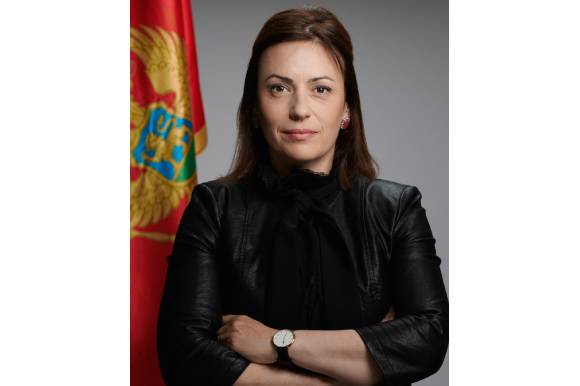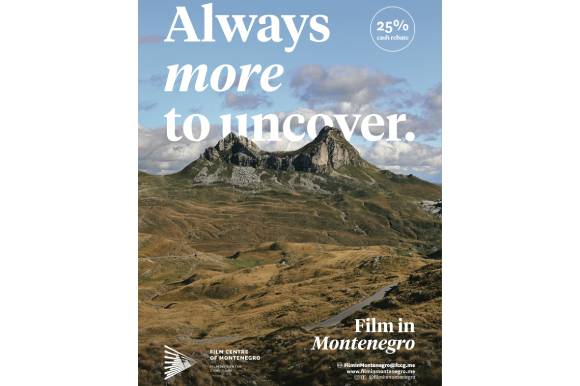 FNE: What are the most important things that the Film Centre of Montenegro has accomplished in five years? What aspects still need your attention?
FNE: What are the most important things that the Film Centre of Montenegro has accomplished in five years? What aspects still need your attention?
Aleksandra Božović: Only five years ago, the Film Centre of Montenegro was established with the aim of creating a stable film industry system in our country and to make it recognised by the artistic expression of filmmakers from this part of the Balkans. We have achieved this goal quite well and many other goals have emerged from it. They maintain our work energy and motivate us to move forward.
Montenegrin films have gained their place in European and world cinemas, festivals, industry events to a much greater extent than before, and our professionals have been given the opportunity to connect more strongly with the international film community and to be part of quality projects. Funding for domestic films, networking, coproductions, promotion, attractive film locations, technical and technological improvements continue to need our attention, and the Film Centre of Montenegro is here to continue working in the same direction, always bearing in mind the importance of enhancing the quality and visibility of a small film system like ours.
In short, a lot has been launched and created in the last five years, which is especially due to the small but brilliant team of people who work at the Film Centre of Montenegro.
FNE: During the pandemic, the Film Centre of Montenegro has developed the project “Film in Montenegro” and launched the website www.filminmontenegro.me as a tool for international partners interested in shooting in Montenegro. What are the main ideas of this project?
Aleksandra Božović: Our programme “Film in Montenegro” was launched in 2019, with the aim to promote Montenegro as a film destination and present it to the world in a modern and visually attractive way. As the programme started picking up pace during the COVID-19 pandemic, when most film festivals were canceled or held online, and when travel and live contact with producers were virtually impossible, the Centre focused on digital tools during that period, primarily through the creation of the web platform www.filminmontenegro.me, which was conceived as a one-stop-shop with all key information necessary for producers to get acquainted with the state of the film sector in our country. The programme was also promoted at most relevant film markets, as well as through a marketing campaign in renowned magazines specialised in the promotion of film locations, such as Makers and World of Locations.
The core of the "Film in Montenegro" programme consists of incentives for foreign producers, the so-called "cash rebate", in the form of a return of 25% of the funds invested by a foreign producer in the filming of film and television projects in Montenegro. The government adopted it in 2017, and it was a crucial step that made Montenegro catch up with the countries in the region. In addition to unique locations, cultural heritage and other benefits, it offers producers concrete incentives to film their projects in Montenegro.
FNE: What is FCCG's strategy for promoting Montenegro abroad and positioning it on the map of European film destinations?
Aleksandra Božović: Our goal is, first of all, to draw attention to Montenegro. Even though we are a Mediterranean country, we still don’t have the kind of visibility that neighbouring Croatia, or Italy and Greece have. In a way, what we offer to international producers is similar to what these other countries offer, only in a smaller, more compact form, and at significantly lower cost in terms of crew rates, equipment rental, etc.
The backbone of our promotional strategy relies on the fact that Montenegro, with its abundance of diverse locations and diversity of cultural heritage, can very successfully "play" many other locations, even the exotic ones, and offer producers more competitive prices compared to the region, not to mention the rest of Europe.
FNE: In 2021, the Film Centre of Montenegro signed a Cooperation Agreement with the National Tourist Organisation (NTO) in Montenegro. What are the first results of this agreement or how soon are they expected to be seen?
Aleksandra Božović: Last year we signed a Cooperation Agreement with the NTO, in which we defined key areas of mutual interest, as well as ways to improve and accelerate our cooperation at the institutional level. We see them as an important partner in creating a film-friendly environment in Montenegro, which is a necessary step towards completing Montenegro’s offer as a film destination. Our plan is to create numerous administrative benefits for film crews. Another significant part of our agreement deals with sharing promotional materials, and the joint international promotion of Montenegro as both a tourist and a film destination.
FNE: How important is it for the Film Centre of Montenegro to be proactive in helping Montenegrin film professionals to sharpen their key skills? What are the latest developments in this area?
Aleksandra Božović: The Film Centre of Montenegro strives to connect with proven and recognised organisations that implement industry programmes. In this way, we involve Montenegrin professionals in the process of sharpening their skills, as well as learning new ones that should serve them on the path to further careers.
Although the pandemic brought a lot of difficulties, we managed to implement numerous programmes for Montenegrin professionals in this challenging time, enabling them to advance professionally through various workshops, masterclasses, trainings, panel discussions that we organised. Recently, we have successfully organised a workshop for scriptwriters with Phil Parker. Also, the Film Centre of Montenegro, in partnership with the British Council Montenegro and Herceg Novi Comic Book Festival, has launched the project „Creative Economy – Development of Film Policies in Montenegro“, within which we had the honour of organising masterclasses with big names of contemporary cinema, new media and comics: William  Simpson, the main storyboard artist of the Game of Thrones, Brian Kirk, one of the Game of Thrones directors, as well as the legendary comic artist Walter Venturi.
Simpson, the main storyboard artist of the Game of Thrones, Brian Kirk, one of the Game of Thrones directors, as well as the legendary comic artist Walter Venturi.
I will also mention that among the awards given at this year's FEST Forward Market in Belgrade there was the Film Center of Montenegro Co-Development Award, which is also a way to encourage professionals from our region to develop their skills. This, among other things, is what the awards are established for, and the above mentioned is just one of the awards given by the Film Center of Montenegro within various industry programmes during the five years of our work.
Collaboration with universities and faculties is also important to us. In cooperation with the University of Montenegro, we have several programmes that support the professional development of young filmmakers.
In addition, I am especially glad to point out the "Radomir Pule Milovic" Scholarship, which we award every year to the best student of Film production from Montenegrin faculties.
FNE: How is the domestic film production doing now that the pandemic is almost over?
Aleksandra Božović: The Film Centre of Montenegro has recently announced calls for script development and project development. They will surely bring us new film stories, and we are also counting on the realisation of those we have already supported. The situation after the pandemic has calmed down and more and more teams are returning to filming, which we are very much looking forward to. This will bring new Montenegrin films that we will soon have the opportunity to promote internationally.
We have also made a calendar of open calls for 2022, so, let’s say, there is no break. The film system is a living mechanism and we must keep it as active as possible.
I will also mention that Ivan Marinović is currently in preparation with his farcical comedy Forever Hold Your Peace, which he plans to start shooting on 13 May 2022. The film is a coproduction between Montenegro, Serbia, the Czech Republic, Croatia, North Macedonia and Slovenia, and it is supported by Film Centre of Montenegro.
FNE: As the amount of funds allocated by the Film Centre of Montenegro for competitions is growing from year to year, where do you see the domestic film production in five years from now?
Aleksandra Božović: If the path of development ahead of us is as progressive as in these first five years, when we managed to successfully present Montenegrin film in Europe and in the world, we expect that in the next five years we will have even better and more competitive films, wider engagement of domestic staff, and better international visibility of Montenegrin films, which, as I have already mentioned, is among the primary long-term goals.
FNE: In December 2021, the Film Centre of Montenegro, together with the Ministry of Culture and six municipalities, all agreed to contribute to the digitalisation of the cultural centres in six towns, which should be done by the end of 2022. How many other cinemas are waiting to be digitalised and when do you think it will happen?
Aleksandra Božović: The digitalisation of cinemas in six municipalities in Montenegro is one of the most important projects with which we completed last year's work. Montenegro is a small country, and our goal is for every city to have a cinema. As every part of our country is a potential film location, it is necessary to bring such a small number of inhabitants as close as possible to the film industry, because we see it as a great economic potential.
In the end, let's say that a film friendly country must have film friendly people, and there can be more and more of them if everyone has adequate space to experience and enjoy the art of film. The film business as well. The following years leave room for us to complete this task and I am quite optimistic, so I believe that success is yet to come.



















